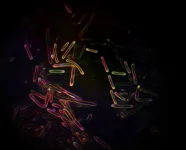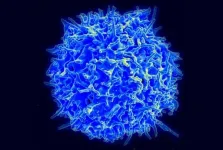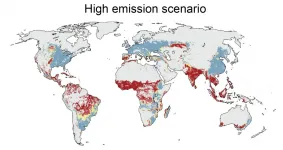(Press-News.org) ITHACA, NY, May 13, 2021 -- Cyanobacteria are one of the unsung heroes of life on Earth. They first evolved to perform photosynthesis about 2.4 billion years ago, pumping tons of oxygen into the atmosphere - a period known as the Great Oxygenation Event - which enabled the evolution of multicellular life forms.
Led by BTI faculty member END
New cyanobacteria species spotlights early life
Anthocerotibacter panamensis, a newly discovered species of cyanobacteria, can help researchers study the dawn of oxygenic photosynthesis
2021-05-14
ELSE PRESS RELEASES FROM THIS DATE:
Teachers' gender, sexuality, and age affect perceptions of sexual misconduct of students
2021-05-14
The United States has witnessed a steep rise in reports, arrests, and media coverage of teachers' sexual misconduct with students. A new study investigated the impact of perpetrators' gender, sexuality, and age on perceptions of teacher sexual misconduct. The study found that
responses to teachers' misconduct varied according to certain characteristics, which can influence whether victims report the misconduct.
The study, by researchers at Prairie View A&M University and the University of Nevada, Reno, appears in Feminist Criminology.
"Because sexual abuse of a child or adolescent in any context has substantial psychological, emotional, and physical consequences for the victim, teachers' sexual misconduct is a serious public health ...
You're so vein: Scientists discover faster way to manufacture vascular materials
2021-05-14
Developing self-healing materials is nothing new for Nancy Sottos, lead of the Autonomous Materials Systems Group at the END ...
U-M researchers trace path of light in photosynthesis
2021-05-14
Three billion years ago, light first zipped through chlorophyll within tiny reaction centers, the first step plants and photosynthetic bacteria take to convert light into food.
Heliobacteria, a type of bacteria that uses photosynthesis to generate energy, has reaction centers thought to be similar to those of the common ancestors for all photosynthetic organisms. Now, a University of Michigan team has determined the first steps in converting light into energy for this bacterium.
"Our study highlights the different ways in which nature has made use of the basic reaction ...
Most pediatric spinal fractures related to not wearing seatbelts
2021-05-14
May 14, 2021 - Two thirds of all pediatric spinal fractures, especially in the adolescent population, occur in motor vehicle accidents (MVAs) where seatbelts are not utilized, reports a study in Spine. The journal is published in the Lippincott portfolio by Wolters Kluwer.
"Over 60 percent of pediatric spinal fractures occur in children ages 15 to 17, coinciding with the beginning of legal driving," according to the new research by Dr. Vishal Sarwahi, MD, of Cohen Children's Medical Center, New Hyde Park, NY, and colleagues. They emphasize the need for measures to increase seatbelt usage, particularly by younger drivers, and outline the potential trauma that can be avoided through proper seatbelt use.
Seatbelts save lives... and ...
New benefit increases Veterans' access to urgent care in the community
2021-05-14
May 14, 2021 - Two years ago, the Veterans Affairs healthcare system (VA) began rolling out a new benefit, enabling Veterans to receive urgent care from a network of community providers - rather than visiting a VA emergency department or clinic. Progress toward expanding community care services for Veterans is the focus of a special supplement to the May issue of Medical Care. The journal is published in the Lippincott portfolio by Wolters Kluwer.
The urgent care benefit "provides a new way to deliver unscheduled, low-acuity acute care to Veterans," according to the ...
New pre-clinical model could hold the key to better HIV treatments
2021-05-14
A team led by researchers at Weill Cornell Medicine and Children's National Hospital has developed a unique pre-clinical model that enables the study of long-term HIV infection, and the testing of new therapies aimed at curing the disease.
Ordinary mice cannot be infected with HIV, so previous HIV mouse models have used mice that carry human stem cells or CD4 T cells, a type of immune cell that can be infected with HIV. But these models tend to have limited utility because the human cells soon perceive the tissues of their mouse hosts as "foreign," ...
Our dreams' weirdness might be why we have them, argues new AI-inspired theory of dreaming
2021-05-14
The question of why we dream is a divisive topic within the scientific community: it's hard to prove concretely why dreams occur and the neuroscience field is saturated with hypotheses. Inspired by techniques used to train deep neural networks, Erik Hoel (@erikphoel), a research assistant professor of neuroscience at Tufts University, argues for a new theory of dreams: the overfitted brain hypothesis. The hypothesis, described May 14 in a review in the journal Patterns, suggests that the strangeness of our dreams serves to help our brains better generalize our day-to-day experiences.
"There's obviously an incredible number of theories of why we dream," says Hoel. "But I wanted to bring to ...
Mammals can use their intestines to breathe
2021-05-14
Rodents and pigs share with certain aquatic organisms the ability to use their intestines for respiration, finds a study publishing May 14th in the journal Med. The researchers demonstrated that the delivery of oxygen gas or oxygenated liquid through the rectum provided vital rescue to two mammalian models of respiratory failure.
"Artificial respiratory support plays a vital role in the clinical management of respiratory failure due to severe illnesses such as pneumonia or acute respiratory distress syndrome," says senior study author Takanori Takebe (@TakebeLab) of the Tokyo Medical and Dental University and the Cincinnati Children's Hospital Medical Center. "Although the side effects and safety need to be thoroughly ...
Climate change threatens one-third of global food production
2021-05-14
Climate change is known to negatively affect agriculture and livestock, but there has been little scientific knowledge on which regions of the planet would be touched or what the biggest risks may be. New research led by Aalto University assesses just how global food production will be affected if greenhouse gas emissions are left uncut. The study is published in the prestigious journal One Earth on Friday 14 May.
'Our research shows that rapid, out-of-control growth of greenhouse gas emissions may, by the end of the century, lead to more than a third of current global food production falling into conditions in which no food is produced today - that is, out of safe climatic space,' explains Matti Kummu, professor of global water and food issues at Aalto University.
According ...
Changes in filled opioid, naloxone prescriptions before, during COVID-19
2021-05-14
What The Study Did: Researchers analyzed changes in filled prescriptions for naloxone (medication to reverse opioid overdoses) during the COVID-19 pandemic in the United States and compared them with changes in opioid prescriptions and overall prescriptions.
Authors: Ashley L. O'Donoghue, Ph.D., of the Beth Israel Deaconess Medical Center in Boston, is the corresponding author.
To access the embargoed study: Visit our For The Media website at this link https://media.jamanetwork.com/
(doi:10.1001/jamahealthforum.2021.0393)
Editor's Note: The ...
LAST 30 PRESS RELEASES:
Ketamine high NOT related to treatment success for people with alcohol problems, study finds
1 in 6 Medicare beneficiaries depend on telehealth for key medical care
Maps can encourage home radon testing in the right settings
Exploring the link between hearing loss and cognitive decline
Machine learning tool can predict serious transplant complications months earlier
Prevalence of over-the-counter and prescription medication use in the US
US child mental health care need, unmet needs, and difficulty accessing services
Incidental rotator cuff abnormalities on magnetic resonance imaging
Sensing local fibers in pancreatic tumors, cancer cells ‘choose’ to either grow or tolerate treatment
Barriers to mental health care leave many children behind, new data cautions
Cancer and inflammation: immunologic interplay, translational advances, and clinical strategies
Bioactive polyphenolic compounds and in vitro anti-degenerative property-based pharmacological propensities of some promising germplasms of Amaranthus hypochondriacus L.
AI-powered companionship: PolyU interfaculty scholar harnesses music and empathetic speech in robots to combat loneliness
Antarctica sits above Earth’s strongest “gravity hole.” Now we know how it got that way
Haircare products made with botanicals protects strands, adds shine
Enhanced pulmonary nodule detection and classification using artificial intelligence on LIDC-IDRI data
Using NBA, study finds that pay differences among top performers can erode cooperation
Korea University, Stanford University, and IESGA launch Water Sustainability Index to combat ESG greenwashing
Molecular glue discovery: large scale instead of lucky strike
Insulin resistance predictor highlights cancer connection
Explaining next-generation solar cells
Slippery ions create a smoother path to blue energy
Magnetic resonance imaging opens the door to better treatments for underdiagnosed atypical Parkinsonisms
National poll finds gaps in community preparedness for teen cardiac emergencies
One strategy to block both drug-resistant bacteria and influenza: new broad-spectrum infection prevention approach validated
Survey: 3 in 4 skip physical therapy homework, stunting progress
College students who spend hours on social media are more likely to be lonely – national US study
Evidence behind intermittent fasting for weight loss fails to match hype
How AI tools like DeepSeek are transforming emotional and mental health care of Chinese youth
Study finds link between sugary drinks and anxiety in young people
[Press-News.org] New cyanobacteria species spotlights early lifeAnthocerotibacter panamensis, a newly discovered species of cyanobacteria, can help researchers study the dawn of oxygenic photosynthesis



